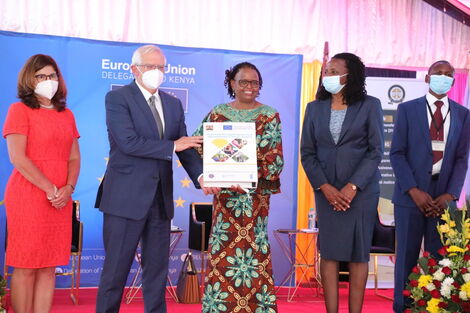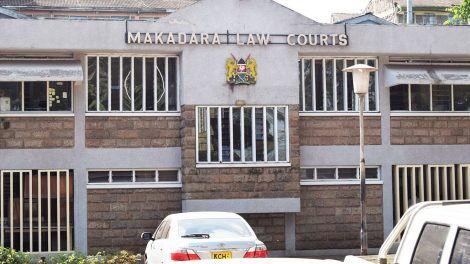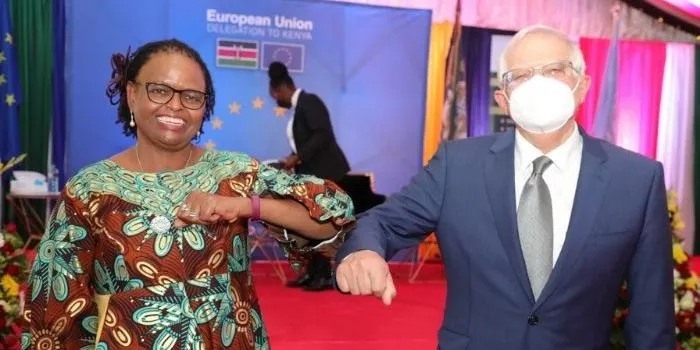-
Chief Justice Martha Koome (left) and the High Representative of the European Union for Foreign Affairs and Security Policy, Joseph Borrell at Makadara Law Courts.FILE
-
Chief Justice Martha Koome has secured a Ksh4.5 billion funding deal after an agreement reached by officials from the European Union (EU).
In a statement to the press on Sunday, January 30, the Judiciary indicated that the new funding forms the second phase of the Programme for Legal Empowerment and Aid Delivery in Kenya (PLEAD II)
The High Representative of the European Union for Foreign Affairs and Security Policy, Joseph Borrell, in a meeting attended by Koome at Makadara Law Courts on Friday, January 28, noted that the new funding would take effect in 2022 and run till 2028.
He further noted that PLEAD was the biggest EU justice programme in sub-Saharan Africa with the new phase expected to give focus on capacitating the criminal justice system to fight corruption more effectively.
 Chief Justice Martha Koome (third left), the High Representative of the European Union for Foreign Affairs and Security Policy, Joseph Borrell (second left) and other officials at Makadara Law Courts.FILE
Chief Justice Martha Koome (third left), the High Representative of the European Union for Foreign Affairs and Security Policy, Joseph Borrell (second left) and other officials at Makadara Law Courts.FILEThe fund will also be directed towards harnessing the potential of digital technologies to improve access to justice with the biggest beneficiaries being vulnerable people.
PLEAD is delivered by the United Nations Office on Drugs and Crime (UNODC) in association with the United Nations Development Programme (UNDP) Kenya, National Commission for the Administration of Justice (NCAJ), Department of Justice (DoJ) and National Legal Aid Service (NLAS), supported by civil society and other judicial sector players.
“PLEAD has initiated transformative criminal justice reforms in Kenya, delivered key support to judicial institutions and allowed to develop an extensive offer of legal aid services to vulnerable and marginalised citizens.
"In the upcoming months, together with the Judiciary, our teams from the EU, UNODC, UNDP and civil society stakeholders will work together to pave the way forward for better access to justice and improved fight against corruption in Kenya," he stated.
Koome praised the new partnership noting that it would advance the transformative agenda aimed at improving the delivery of justice launched by the programme's first phase.
Among the success is access to justice especially for the poor and vulnerable, through the provision of legal aid as well as the strengthening of court administration and case management among others.
“We have seen significant improvement in institutional effectiveness and performance by the various actors in the justice sector. The support from the PLEAD I programme enabled the actors within the justice sector to continue delivering services despite the challenges brought by the COVID-19 pandemic,” the Chief Justice remarked.
The support under PLEAD I contributed towards ensuring a collaborative and consultative approach among member agencies under the National Council on the Administration of Justice (NCAJ) that enhanced access to justice.
Key achievements included the multi-agency response to the global pandemic, the development of policy including the diversion Policy and the plea-bargaining guidelines. PLEAD support also strengthened Court User Committees and the development of the NCAJ Strategic Plan 2021-2026.
In April 2021, the EU launched plead Phase 1 by approving a Ksh945 million (7.25 million euros) grant for the government to provide legal services to poor Kenyans.
 Man lying outside Makadara Law Courts in Nairobi after Collapsing moments to case hearing on Thursday, August 6, 2020.TWITTER By Derrick Okubasu, Kenyans.co.ke
Man lying outside Makadara Law Courts in Nairobi after Collapsing moments to case hearing on Thursday, August 6, 2020.TWITTER By Derrick Okubasu, Kenyans.co.ke






